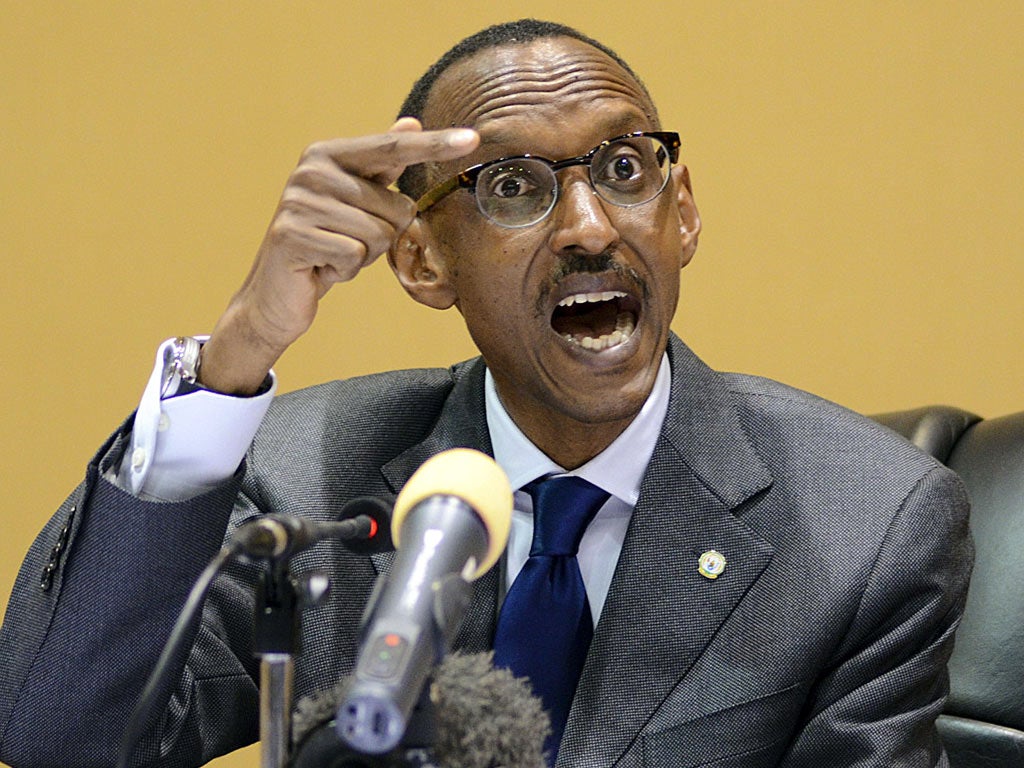Kagame puts down marker for third term
Pro-democracy activists fear that Rwandan strongman plans to extend his term in office

Your support helps us to tell the story
From reproductive rights to climate change to Big Tech, The Independent is on the ground when the story is developing. Whether it's investigating the financials of Elon Musk's pro-Trump PAC or producing our latest documentary, 'The A Word', which shines a light on the American women fighting for reproductive rights, we know how important it is to parse out the facts from the messaging.
At such a critical moment in US history, we need reporters on the ground. Your donation allows us to keep sending journalists to speak to both sides of the story.
The Independent is trusted by Americans across the entire political spectrum. And unlike many other quality news outlets, we choose not to lock Americans out of our reporting and analysis with paywalls. We believe quality journalism should be available to everyone, paid for by those who can afford it.
Your support makes all the difference.Rwandans campaigning for democracy in their country yesterday said that they were "chilled to the bone" by a signal sent by the strong-arm President Paul Kagame that he intends to extend his term in power.
An independent analyst went further, saying that comments made by Mr Kagame yesterday during a visit to neighbouring Uganda could destabilise the Great Lakes region by leaving no option open to the Rwandan opposition other than to take up arms.
Mr Kagame has been in power since the end of the Rwandan genocide in 1994. For a long time he enjoyed wide international support as a result of Western guilt over its failure to prevent the killing of hundreds of thousands of Tutsis. In a legacy of Tony Blair's era, Britain remains one of the leading advocates of Mr Kagame's regime. But amid growing claims – strenuously denied – that Mr Kagame's supporters are ordering political assassinations, human-rights activists increasingly denounce his regime.
Speaking at a press conference in the Ugandan capital, Kampala, he contradicted previous categorical assurances that he would step down at the end of his constitutional two terms in office. His comments came after Rwanda's Internal Security Minister Sheikh Fazil Musa Harerimana was quoted calling for the constitution to be changed so that the President could run again.
Mr Kagame claimed anyone asking for him to run again was exercising their freedom of expression. Reuters reported that he said: "I will not be uncomfortable at all with people saying this or the other. There's contradiction, on one hand you say people should have freedom to express themselves. On the other hand, you start questioning somebody expressing himself."
Mr Kagame, who led the Rwandan Patriotic Front (RPF) to victory in the rebel war linked to the genocide, was re-elected last year. His main opponent, Victoire Ingabire, remains in jail after she was prevented from running in the election.
The next elections are not due until 2017. Analyst Paul-Simon Handy said Mr Kagame's early move to reveal his intentions suggests deep internal divisions in the ruling RPF.
Mr Handy, a Cameroonian who is head of research at the Institute for Security Studies in Pretoria, South Africa, said: "The fact that Kagame is openly floating the idea of changing the constitution is extremely dangerous. It marks a radical switch in his tactics. He has always previously said that Rwanda is a constitutional country and that he will abide by the constitution. Given the level of repression in Rwanda, the opposition will consider taking up arms to be their only option."
Joseph Matata, a human-rights activist, said from Brussels, he was "chilled to the bone" by the prospect of Mr Kagame remaining in power and the potential bloodshed that could result from such a move. "Kagame faces being arrested for war crimes carried out in Eastern Congo (where Rwanda supports rebel groups guarding mineral deposits) and he knows that international judges will not touch him as long as he is President," Mr Matata, who leads the Centre Opposed to Impunity and Injustice in Rwanda, said.
The opposition Parti Social Imberakuri's co-ordinator in Brussels, Jean-Baptisre Ryumugabe, said: "We are not surprised that the call for a third term has come through the Internal Security Minister. Kagame always floats his ideas through his close collaborators."
Mr Ryumugabe denied the opposition would take up arms. "As democrats we believe in peaceful means," he said.
Human-rights activists have in recent months denounced an apparent rise in the number of attempts on the lives of Mr Kagame's critics. The most recent was the journalist Charles Ingabire, who was shot dead on 1 December at a bar in Kampala.
Mr Kagame said that Mr Ingabire was a thief who was killed because he stole from an association of genocide survivors.
Join our commenting forum
Join thought-provoking conversations, follow other Independent readers and see their replies
Comments